Run to Pearl River After Katrina
September 2, 2005
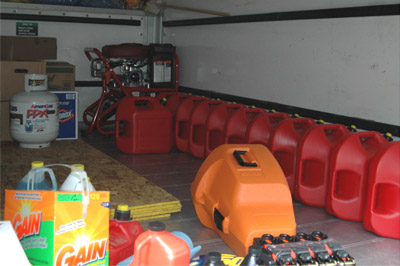 |
After two days of busily gathering supplies, we were set for our trip to Louisiana. We had loaded a Uhaul with a big generator, about 20 cans of gas, and a load of supplies and tools. We left at a little after 3 am for the run to Pearl River. We wanted to give a lot of time to get there because of uncertain gas supplies and road conditions. We had small walkie talkies to communicate between Jeff and I. |
We were to meet Jay Victory in Birmingham. We waited for him about an hour because we didn't think about the fact that he was on Central time. Also, the van he was driving was vibrating badly. We had to leave it there in Birmingham, transfer supplies to our vehicles and proceed.
Since our usual routh along I-59 south from Meridian, MS was closed, we continued on I-20 to Jackson, MS and southward on I-55. This leg of the trip was long and frustrating (More detail). After failing to get much gas in Jackson, we stopped at Brookhaven, MS where three or four stations had gas and long waiting lines. The U-Haul and our VW van are just turning the corner in the line below.

The line ran about a block along the street and then to the back of the Walmart parking lot before coming back to the pumps. We waited from 3 to 7 pm, including the better part of an hour for a gas truck to unload –giving us the confidence to continue waiting. About 15 cars from the pump, they ran out again so we had wasted not only a lot of time but gas as well.
We were this close to the pumps when the gas ran out! |
 |
We now had no choice but to go into our gas reserve, so we stopped again on a small dirt road to transfer gas from the truck to the van plus the truck's tank. Driving into darkness, we had to stop one more time to add enough gas to get to Pearl River. The trip took over 18 hours and over 600 miles, compared to about 470 miles and less than 7 hours normally.
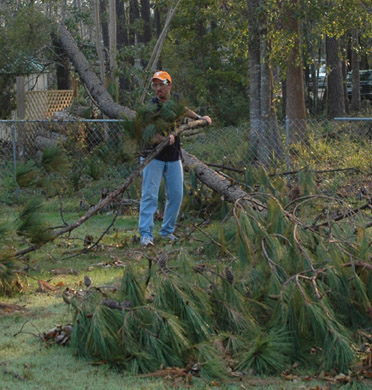 |
Having reached the house in eerie darkness and silence last night, the bright morning sun was welcome. I had wired in the generator, so we had power to fix coffee and have lights. Fortunately, Jeff's house was not damaged and the only significant loss was from this tall pine tree that crushed the back fence. Jay jumped on it and sawed it up. Jeff and I fixed the fence and put up screens on the windows. That got his house fixed up and we were ready to tackle other things. |
| Jay Victory and Perry Matherne have lunch on the front porch. We had lights and basic appliances from the generator, but not enough to run the air conditioning and it was very hot. Jay and Perry had gone over to Jay's house in the south part of Slidell to see what they could salvage. Jay's house had about six feet of water from the storm surge so there was not much to salvage. Jay and Perry stayed at Jeff Nave's house with Jeff Moyle and myself for the first four days. |
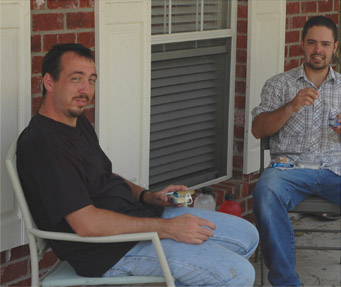 |
In retrospect, Jay's arrival back at Jeff's house after having visited his own flooded house sticks in my mind as an example, and I have used it on several occasions. He arrived at the house with his pickup truck with just a few things in the truck, including a plastic toy box shaped like Noah's Ark and his daughter's teddy bear, which she was overjoyed to receive when she got there. The water had reached almost to the ceiling in his house, and essentially everything was destroyed. Essentially everything he saw to salvage was in the back of his pickup. But this floating toy box carried his daughter's teddy safely up to near the ceiling, and it was fine. While we were talking about this scenario and mourning his loss, he made the statement that I have quoted often. "It was just 'stuff'. It was not a part of the image of God within me." I write this retrospective 9 years later as I prepare to again quote him in a lesson on greed and materialism.
Another retrospective, which is probably repeating some other comments in this description of Katrina, is a great respect for the people who were so impacted by Katrina in Slidell and Pearl River. News reports in Atlanta spoke of looting, warned against going to the storm area, and generally produced the picture of a selfish and dangerous population of the storm area. I still resent strongly that bias in reporting, and what we found was nearly everybody trying to help and a lot of heroic effort. In spite of the terrible losses, people rose to the occasion and it produced an inspiring camaraderie and a touching example of the kind of nobility to which the human spirit can rise in time of crisis.
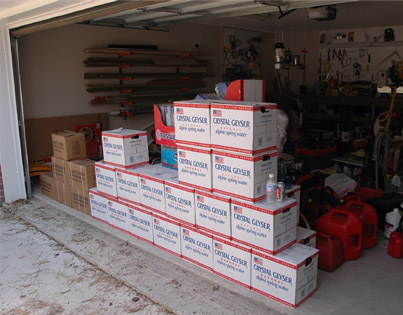 |
Since Jeff's house was not damaged, it was used as a staging area for some water and MREs (Meals Ready to Eat), supplied by Stan Lewis' church, Olive Baptist Church in Pensacola. We had several generators which we distributed as well. Stan's mission group made daily trips to Slidell to bring relief supplies. |
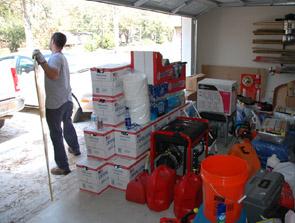 |
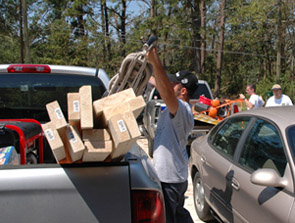 |
Jeff Nave, Jeff Moyle, Perry Matherne and I load up materials to go over to try to secure the heavily damaged Moyle house.
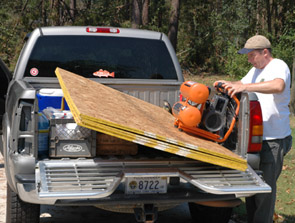 |
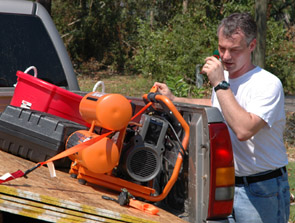 |
Jeff Nave loads plywood and a compressor on the truck for the roof project. Jeff Moyle straps down the load at right above.
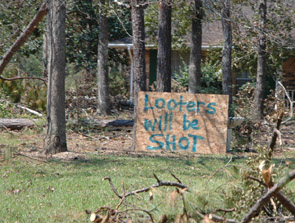 |
As we drove the four miles or so to the Moyle house, we saw the enormous amount of tree damage. Without electricity, there was yet a lot of work going on and lots of people present to protect their property. Since probably nearly everyone in Pearl River owns a gun, I wouldn't want to be a looter there. There were a variety of signs such as the one above left. In the presence of thousands of downed trees, the power company workers were hard at it and the Fire Station was busy with relief supplies. |
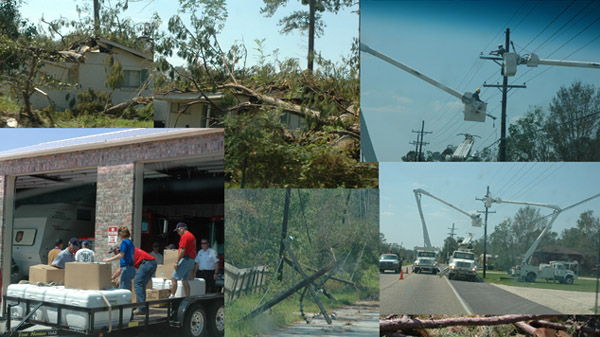
The small inset at center bottom above is the road into Magnolia Forest where the Moyle's house is located. Most of the power lines were down, and a large fraction of the huge pine trees was down.
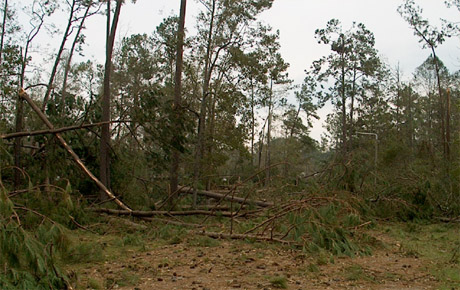 |
This was the view straight down Ormand Drive on the way to Dave and Judy's house right after the storm. There are so many trees and so much pine debris that you can hardly see the road. This was taken by Jeff Moyle, who cut most of these trees out. |

This was the view of the front of the Moyle house from Ormand Drive, with multiple pine trees laying across it.
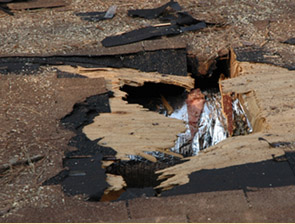 |
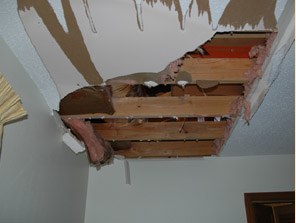 |
One of the seven large pine trees that crashed onto the Moyle roof crushed a 2x3 foot hole through the front roof of the house, taking down a section of their living room ceiling. This section was just above where Judy puts her Christmas village and train set for our Christmas celebration at their house. Ironically, we wound up using one of the pieces of plywood that she used for that village to patch the roof hole above the location so that it would hold up a tarp.
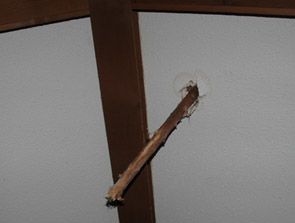 |
Another pine tree punched a limb all the way through the roof and the ceiling of the den and down over three feet into the den. In retrospect, the size of the water ring around this limb on the ceiling tells us that there was not a lot of rain after this point, and that is encouraging for the restoration of the house. There does not appear to be a lot of severe water damage. |
 |
The worst damage to the Moyle house was the crushing of the master bedroom ceiling at the back of the house by a huge pine tree. Jeff Moyle had led a crew of tree cutters from the Olive Baptist Church out there the day before to cut the trees off the house. |
This is the huge pine tree that caused all this damage. The most surprising thing was that it didn't crush the house all the way to the foundation. |
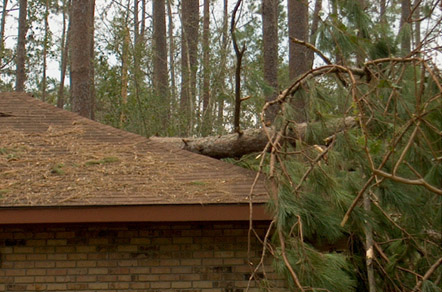 |
| Now our job was to get it to the point where we could tarp it. After Jeff Nave and Perry had removed some of the covering debris, we were amazed at the shattering of solid yellow pine 2x8s which formed the roof joists. |
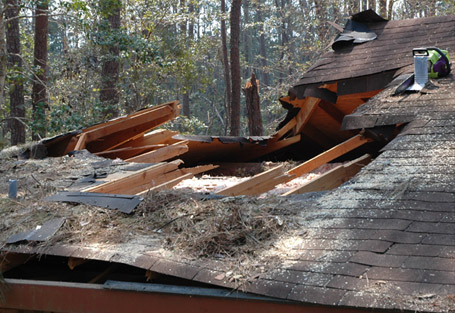 |
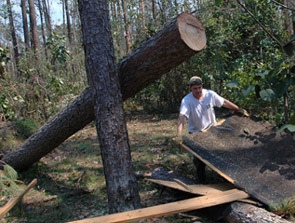 |
 |
Above left, Jeff drags a piece of removed roofing past the end of the tree that caused most of the damage. If that huge tree had not been partially caught by its roots, it would probably have crushed the house all the way to the ground. Above right you can see four of the cut off tree trunks of the trees that fell on the house. Note that they are all pointing toward the house.
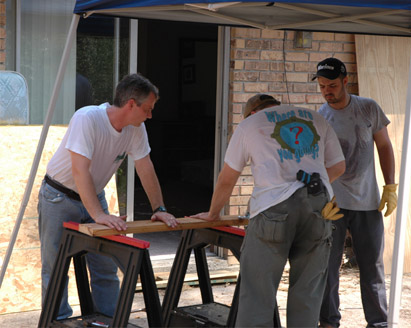 |
After cleaning the tree debris off the patio, we set up there with a generator to run the skilsaw and the air compressor. Jeff Moyle, Jeff Nave and Perry start cutting patching material. Note that Jeff is still carrying a pistol - we didn't directly encounter any reason to do so, but for the first few days considered it a reasonable precaution. |
 |
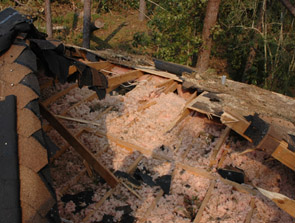 |
More views of what we were up against. The right picture above shows the shattered roof joists and is pointing "down the gunbarrel" of the cut-off tree that caused this damage. It's roots are still in the ground.

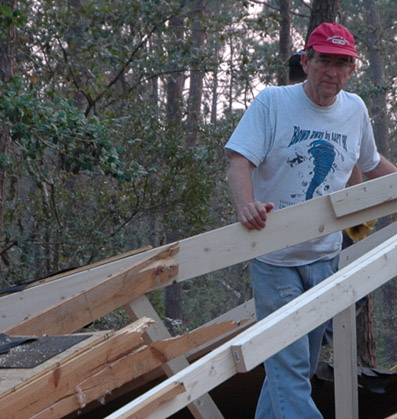 |
Rod and Perry above among the pieced-together rafters that we put in to hold plywood for tarping. We were grateful that we had brought Mark's air nailer. We ran the compressor from a generator and used the air nailer to nail new rafters to the shattered peices of the old ones. You can tell from the sky color that we are near sunset getting to this point. |
 We ripped everything we could find into strips and started pinning down the tarps. |
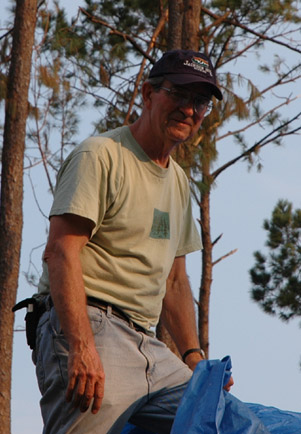 |

One of the huge tarps we had gotten would cover the whole front of the house. The large white patch on the roof is part of the top of Judy's Christmas scene table, and it protects the large hole in the roof over where she always put that table in the living room.
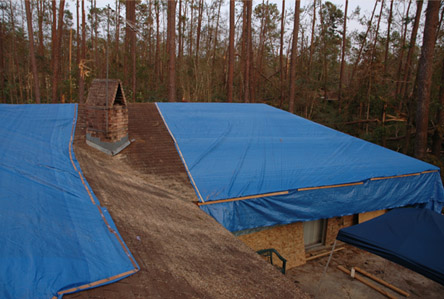 |
Jeff used Mark's air nailer to nail the edges of the tarps to the facia boards and we cut narrow strips to tie down the loose edges all the way around the tarps. |
| Jeff cut the tarps off close to the house, thinking that would reduce the wind load on the tarp. |
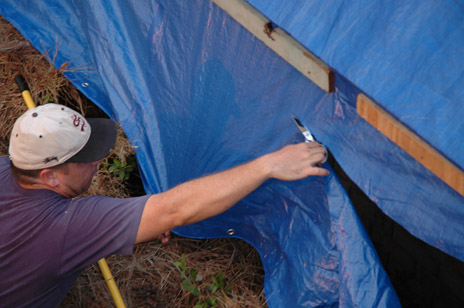 |
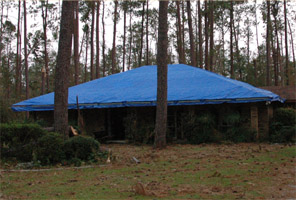 |
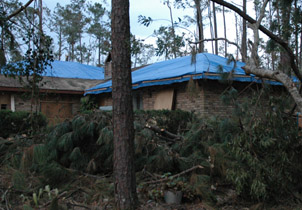 |
The final result was a fairly neat looking blue roof from the front , but a more complicated scene from the back amid all the storm debris. This may not have been the way FEMA would have done it, but we fervently hoped it would keep the house dry for reconstruction.
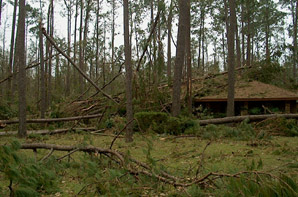 Considering that this was what the front of the house looked like less than a week ago, there was hopeful progress. We at least made a difference you could see from the road. |
 |
| Life in Pearl River and Slidell |
2005
